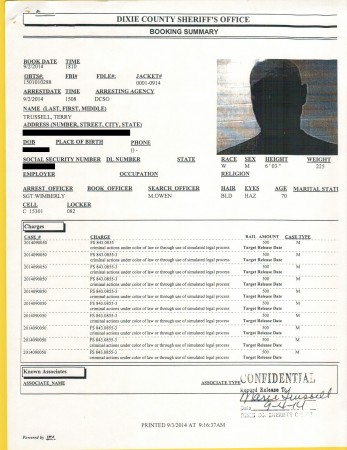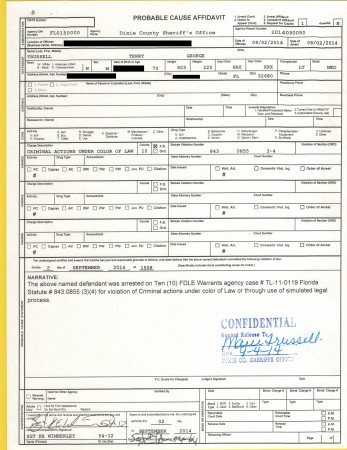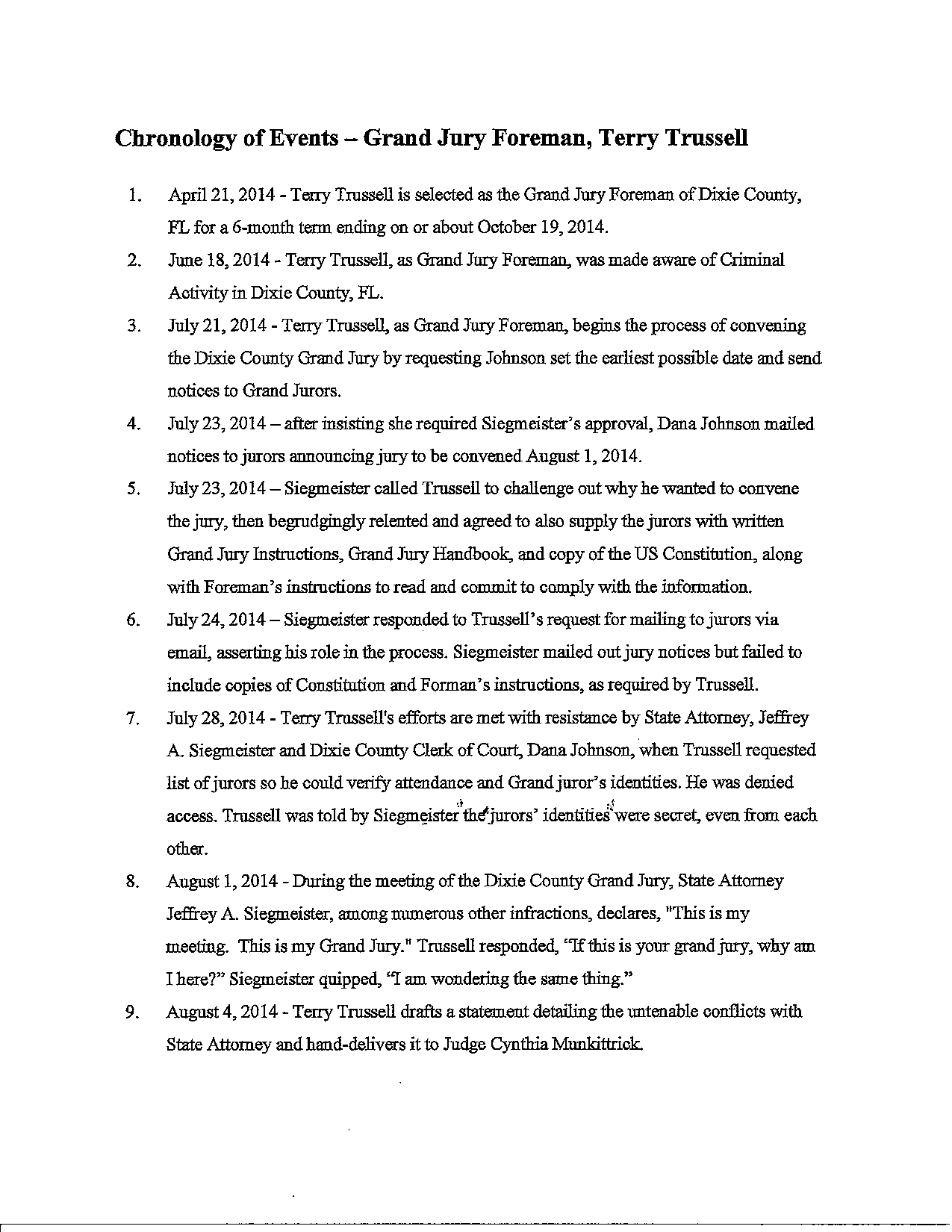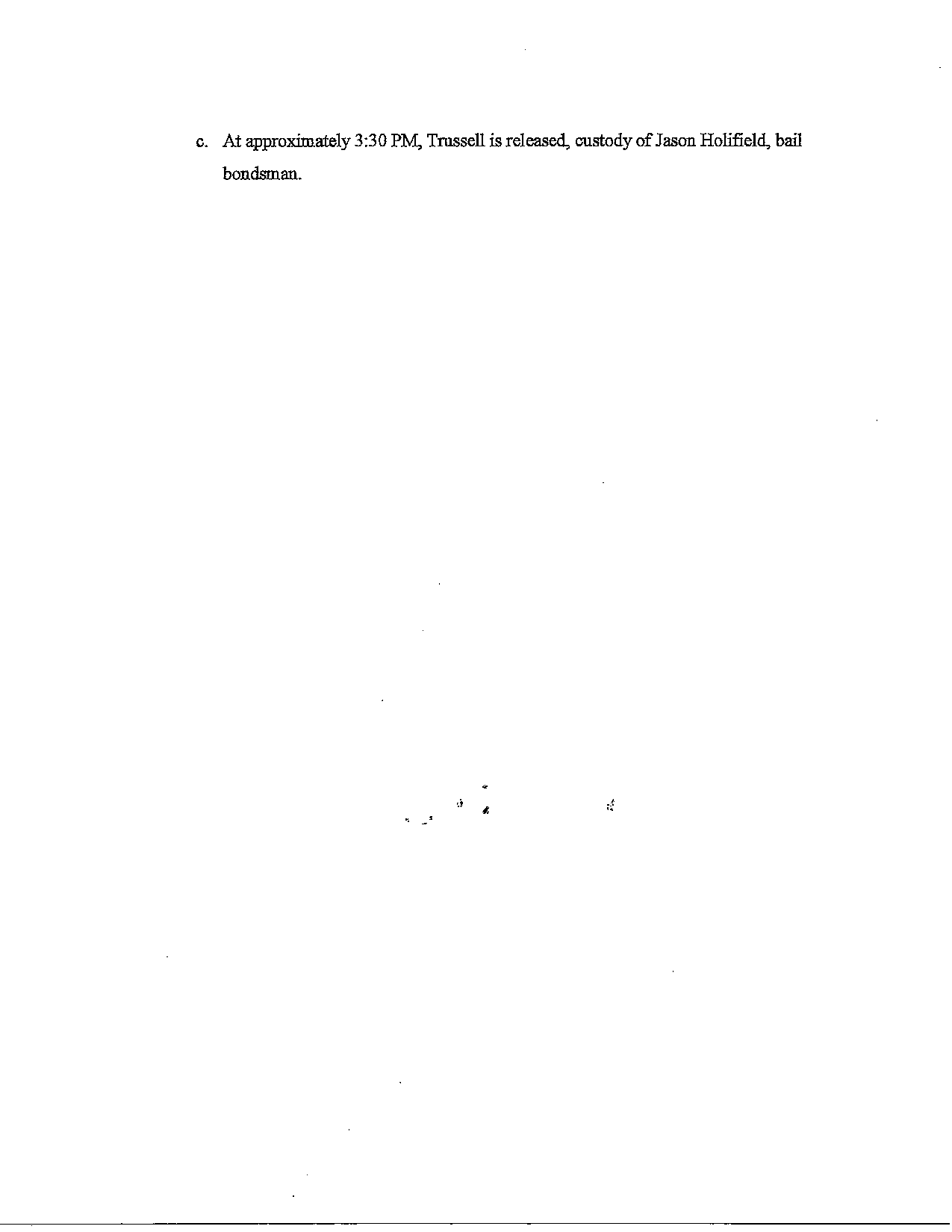“I WAS COMMITTED TO SERVE THE PUBLIC”
by Sharon Rondeau

(Sep. 18, 2014) — On September 2, Dixie County, FL resident and 70-year-old Vietnam combat veteran Terry Trussell was arrested and charged with ten felonies by the Florida Department of Law Enforcement (FDLE) by means of a questionably sworn, incomplete document filed with the Dixie County Sheriff’s Department.
In a September 13 interview with radio host and blogger Jason W. Hoyt, Trussell detailed his background, including his service in Vietnam, business endeavors, encounters with the IRS, and his eventual conclusion that the U.S. government bureaucracy has hampered the cause of freedom and been dishonest with Americans on many issues.
The Post & Email obtained the charging and booking documents directly from the Dixie County Sheriff’s Office through an Open Records request. We also placed a call to the office of State Attorney Jeffrey Siegmeister, Trussell’s accuser, for comment, which was not returned.
On Thursday, we submitted a Public Records request to the FDLE for documents pertaining to Trussell’s arrest to which we received an acknowledgement.
Trussell was duly empaneled from a list of prospective Dixie County jurors in April of this year, and when volunteers to serve as foreman were requested, he did not hesitate. Having served as foreman on two trial juries previously, Trussell looked forward to the experience again. Little did he know at the time that his commitment to uphold his oath of office in a leadership role would land him in jail for a night with ten felony counts levied against him by the FDLE.
Trussell told The Post & Email that he has recently heard a great deal about the case of CDR Walter Francis Fitzpatrick, III (Ret.), who was sentenced to three years in Tennessee state prison after submitting evidence to the McMinn County grand jury identifying wrongdoing on the part of judges, prosecutors and the grand jury foreman, among others. After The Post & Email related some of the particulars of Fitzpatrick’s case, Trussell responded, “Florida is just as bad as Tennessee, if not worse.”
Elected in 2012, state’s attorney Jeffrey Siegmeister had garnered Trussell’s vote on the grounds that he appeared to want to uphold the U.S. Constitution. Trussell told us, “He came to our Tea Party group and spoke on several occasions, and he was always waving around his copy of the pocket Constitution. He always brought copies in with his name affixed to the back of it. He was very, very big on getting rid of all the corruption, and he’s become one of the most corrupt we’ve ever had. I did vote for him, and I’m not happy with the guy…I want my vote back (laughs).”
Trussell found that as prosecutor, Siegmeister appeared to exhibit a different view of the Constitution. After beginning his service as grand jury foreman, Trussell had asked Siegmeister to enclose a copy of the Constitution in a mailing to the members of the grand jury. Siegmeister had refused to provide Trussell with the grand jurors’ names and contact information, necessitating the mailing. “He explained to me the reason he couldn’t send them the Constitution was because he had run out,” Trussell said. “And I said, ‘Jeff, you can download a copy of the Constitution and print it out on three or four pieces of paper. It would have been the smallest thing you included in the mailing.’ And he said, ‘I didn’t think about that.'”
Siegmeister’s official job description as Florida’s Third Judicial Circuit State’s Attorney is “the Constitutional officer charged with representing the State of Florida in Courts within the Third Judicial Circuit, a Circuit comprised of Columbia, Dixie, Hamilton, Lafayette, Madison, Suwannee, and Taylor Counties. Although we primarily think of a State Attorney as being the Chief Criminal Prosecutor, he also represents the State in various civil matters and litigation.”
The Post & Email asked Trussell how he was summoned to be a grand juror, to which he responded:
The grand jury is basically a lottery. If you’re a registered voter, own property or have a driver’s license, you go into a pool. My assumption is that there is some kind of a program they have that will reach in there and randomly select about 150 people, which was the approximately number that were brought in. Of those, some were filtered out. They told me that because I’m 70 years old, I didn’t have to serve; it would be my option. So I opted to serve, because I feel that it’s my duty. At this point, I didn’t know it was a grand jury; I thought I was pulled in for regular jury duty. I’ve served on two other juries in my life, and I always learned a great deal. It was a just a fascinating experience for me. So when most people are trying to get out of jury duty, I’m ready to go. I’m retired, so I have a little more flexibility than most people do.
They filtered it down and got it to the point where they had a basic pool, and then they ran a little lottery where they put some numbers in a hat or a box, and the clerk of court stood up there and pulled the numbers out. We each had our number, so we knew who we were, and they drew the number out and we went up. We were up to 21 people, and I thought, “This is an odd jury.” The juries I had always been on had 12, and on one of them we had two alternates, and on another there was one alternate. So when we got up to 21, I thought, “This is truly strange.” The assistant state attorney for the area stepped up and said, “OK, I’ll tell you what’s happening now. You are the grand jury for the next six months for Dixie County. Would someone like to volunteer to be foreman?” and I raised my hand. I was foreman on the other juries, so I’m accustomed to that, and I’m accustomed to running things. So they made me foreman.
By stroke of luck, whether it was good or bad – we’ll find out, sooner or later – that’s how I ended up on a statutory grand jury.
Florida Grand Jury rules outline the history of the grand jury dating back to the Magna Carta. The rules assert that “It is imperative that you always keep in mind that as a grand juror you are a public official, with the duty of protecting the public by enforcing the law of the land. Therefore, even though you may think a certain law to be unduly harsh or illogical, that should not influence your judgment in carrying out your duties as a grand juror. A citizen has the right to endeavor to change the law. A grand juror, being a public official, has a duty to enforce the law as it exists despite any personal inclinations to the contrary.”
Further, grand jury members are instructed:
The grand jury in addition to the duty of formally indicting those charged with crime has the further important duty of making investigations on its own initiative, which it will report as a “presentment.” This duty permits investigation of how public officials are conducting their offices and discharging their public trusts. The grand jury may investigate as to whether public institutions are being properly administered and conducted. It has the power to inspect those institutions and, if necessary, may call before the grand jury those in charge of the operations of public institutions as well as any other person who has information and can testify concerning them. If the grand jury finds that an unlawful, improper, or corrupt condition exists, it may recommend a remedy.
However, Trussell observed that Siegmeister referred to the grand jury as “his grand jury.” “He used that term several times during the process, and he wanted to make it known to me specifically that he was in charge. He never, at any time, relinquished his control over that jury. In the grand jury instructions, the handbook and the statutes, they keep saying that the grand jury is independent of court or state attorney control, yet that’s not the way it works. They say one thing and do another.”
Trussell continued:
The state attorney maintains control of every aspect of it. He is not required by one statute to be in the grand jury session; by another statute, it says that he “shall,” but only during certain aspects of it such as the questioning of a witness, the vote and the deliberation. Now other than that, he needs to be there to make sure that everything is done legally. That’s fine.
During the proceeding that I was trying to conduct, he wasn’t required to be there at all. We were not going to have any witnesses to be sworn in; we weren’t going to have any witnesses to be questioned; there was not going to be any True Bill that day issued, and had there been, we would have simply given him the information. He didn’t have to be in the session to draft the True Bill; that could have been done at a different time. Plus, he inserted his court reporter on us, and the court reporter, from everything I’ve been able to find, is at the option of the grand jury itself, not the state attorney.
According to the statutes, the audio recording and anything that the court reporter types up is supposed to left with the clerk of court, in custody, in a lock box, secured. We still can’t find those recordings.
When the state attorney walked in to the grand jury session with his entourage – his assistant and the court reporter and a bailiff – I protested. I said, “Wait a minute; this is supposed to be a secret session.” He said, “Oh, these are all my people; I vouch for them.” And when I said, “We don’t need a court reporter for what we’re doing today,” he said, “I’ve known her 20 years; she’s my reporter; I can vouch for her; you don’t have anything to worry about,” which was not the point.
It was all part of what he was doing to maintain absolute control. What’s sad about all of this is the fact that had he just relaxed, if he could have just relinquished his absolute control over the process, we would have been done in about 30 minutes; the jury would have had an opportunity to say “I think so,” “I think not,” whatever; we could have issued a True Bill or not a True Bill. He could have taken that True Bill and said, “OK, I did further investigation on it and I’ve decided that the concerns aren’t warranted.” And it would have been over.
This whole thing did not have to happen, and it was all Siegmeister’s decision to do all of this stuff. He put me in such a bad position; I had sworn an oath, the same oath he swore, and I was committed to serve the public. He was committed to serve his office and his personal best interests. So that was the conflict we had with it, and it accelerated out of control. It could have been solved in any number of places along the way, had the people I was trusting to support me simply done their job. If they had, there’s no way I would be where I am today.
Trussell said that he felt compelled to report Siegmeister’s behavior to the county judge, Judge Cynthia Munkittrick. However, without his knowing, Munkittrick had been replaced by Judge Greg Parker, the chief judge of the Third Judicial Circuit, who was seated in Taylor County. “Nobody told me,” Trussell said. “By not knowing that, I had no idea who I was to go to. I wasn’t sure how to present this; I knew I couldn’t go in and just sit down and say ‘Jeff was misbehaving;’ I had to have something more specific. So I wrote it up. I spent the weekend writing it up; I had seven pages and went through it step by step, everything that happened that I saw was wrong, so they had the full impact of what happened in that courtroom.”
TT Siegmeister Case Summary 081414
I took it to Judge Munkittrick and was told that she was no longer the judge over the grand jury, that I would have to take it to Judge Parker, who was in the next county an hour away. So I said, “I’m the foreman on the jury. I can’t be running around all over the place to do this.” They said, “Don’t worry; he’ll come down here.” Then they told me that he was in that courthouse on Friday when Siegmeister was doing all of this stuff.
I finally got my narrative up to Judge Parker through the clerk of court. I got the response seven days later. Basically, what he did – and this is the essence I got from his note – because I’m such an idiot, I didn’t reach out to him and ask for his help. I didn’t even know the man existed.
There was nothing I could have done on Friday anyway; that’s why I took the time to write it up to substantiate it with facts. I was trying to be a responsible person and live up to my oath of office…
I gave Munkittrick a copy of it, but she refused it. So I filed it with the clerk of court as my “next-in-command.” I’m not an attorney and I’m not a professional court person; I was trying to go on my best understanding of the proper way to do things. Because I made allegations of criminality against the state attorney, I took a copy of it to the sheriff because the sheriff needs to know what’s going on as the chief law enforcement officer, and I’m alleging that laws have been broken.
Nothing happened. I heard nothing from anybody in the seven days until I got the email from the state attorney which included the note from Judge Parker. Until then, I had no idea that there was anything going on anywhere.
Trussell told The Post & Email that he is certain that phone calls and emails were exchanged between Parker and Siegmeister, for which he asked the county clerk for records. He was refused records of the phone calls.
Ultimately, Siegmeister requested Trussell’s removal as grand jury foreman which was generated in an order from Parker.
Trussell provided a chronology of events to The Post & Email from the time he was empaneled and chosen as grand jury foreman to his release from jail on bond.
—————–
Editor’s Note: The second part of our interview with Terry Trussell will go into greater detail as to why, how and under what circumstances he was arrested and charged with ten felonies.
This post was updated on September 30, 2014 at 3:17 p.m. EDT.









Siegmeister is listed as “Conservative” on his sites and his behavior is very odd. I have known many UF grads and many of them seemed to have that same odd aggressive personality that I haven’t seen with other Florida University grads. U of M does seem to generate some of the strangest personalities I have ever seen in my opinion from in state universities. I would expect this type of behavior from Democrats in Monroe or McMinn County Tennessee. Florida has 67 counties and Tennessee has many also. Having lived in the south most of my life- I feel that Florida people or officials will be more forthcoming than Tennessee. I have had friends and relatives that lived there and most were not happy with what goes on there-much worse than Florida. There are some counties in the panhandle where law enforcement has been known to be out of control but like many areas in the U.S. Florida has 19,000 people a month moving into the state. Many people here have the “get rich fast” mentality or “free handout” subscription to life. The ones that have lived here the longest are the ones that have the most experience in reality. Terry is obviously a responsible and patriotic Veteran that wants to follow the law and do what is right. I have lived in Florida since 1959 when I was moved here at 9 years old by my parents and have watched Florida change rapidly over the years. Many areas have become very commercialized for tourism and other venues. Along with economic growth come crime, corruption and bus loads of “entitlement” seekers that have flooded Florida’s government job markets.
Excellent article, Sharon. Thank you.
The follow-up will be interesting. I’ll stay in touch.